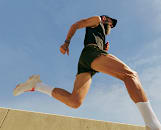
Rawpixel / iStock / Getty Images Plus via Getty Images
Why Your Brain Lights up After Giving and Receiving Exercise Encouragement
Paying someone a compliment is more than a nice thing to do—it just might level up your workout too.
By Greg Presto•
Why Our Brains Thrive on Encouragement During Exercise
How to Give Encouragement During (and After) a Workout
How to High Five on Peloton
Tips for Receiving Exercise Encouragement
Make the Most of Positive Encouragement
The right words are like a turbo boost: Whether it’s an at-work compliment or exercise encouragement, motivating words can help you power through a project or crush your last PR.
Discover more ways to reach your goals with Peloton
Encouraging words “act as part of this broader behavioral reward system that compels us to become more of ourselves, to fulfill our potential,” says Stephanie Harrison, a psychologist and author of New Happy. “Through the act of being encouraged, you're setting yourself up to be able to grow more quickly and more effectively.”
When Peloton instructor Alex Toussaint says to “repeat or evolve,” for example, that fitness encouragement can help you rise to the occasion and improve your future performances, says Lynn Zakeri, a private practice licensed therapist.
“That resonates with me. When I hear that, I want to keep getting better and keep growing,” she says.
You have this motivating power too. In fact, science shows that exercisers may get even more benefit from fitness encouragement from fellow class-goers than they do from a coach.
Here’s why your brain loves exercise encouragement, how it helps your performance, and the right way to encourage others so you can maximize the benefits for yourself and those around you.
Why Our Brains Thrive on Encouragement During Exercise
To your brain, receiving exercise encouragement is like winning the lottery—literally. That’s because our brains regard praise as a reward, and rewards light up a part of our noggin called the ventral striatum.This triggers the release of dopamine, a pleasure chemical.
But Harrison says compliments and fitness encouragement provide other benefits that winning, say, an Instagram sweepstakes, can’t. For starters, they scratch our itch for—and help strengthen—social connections.
“Compliments also indicate belonging and acceptance to each other,” Harrison says. Encouragement “is kind of like putting our arms around somebody and saying, ‘You belong here. You’re part of this group, and you matter to me.’”
Encouragement can also lead to greater feelings of self-efficacy, the psychological feeling that we’re capable, says Matt Scult, PhD, a licensed clinical psychologist and digital mental health consultant. That feeling is key to making healthy changes—when you see that you’re capable of doing something, you feel more capable, which reinforces positive habits.
Exercise encouragement can also increase our actual effectiveness: When we receive praise, we perform better, and that performance feels easier.
In one 2024 study published in the journal Sports, participants who received encouragement while they performed max tests of barbell exercises could lift more weight—5 to 6 percent more—than when they tried the lifts without encouragement. They also felt better: On a “feeling scale,” the participants who received verbal encouragement from their peers rated themselves as feeling 4 out of 5. Those without encouragement were just over 2.
All those good feelings prime us to come back for more. In a 2018 BMJ Open Sport & Exercise Medicine study, women who received verbal encouragement not only biked faster and for longer, but were more likely to want to exercise the next day than other women who didn’t receive verbal encouragement.

Peloton App
Access thousands of classes with no equipment needed.
How to Give Encouragement During (and After) a Workout
Your words are more powerful than you know: Studies have shown that when people give encouragement, they underestimate how good it will make the receiver of that praise feel. That, some scientists say, keeps us from giving more encouragement.
Don’t fall into that trap. Pump up your fellow exercisers with these tips. If you do, there’s a bonus brain benefit for you: In studies on giving compliments and encouragement to strangers, the praise-givers found that offering positive feedback made them feel better too.
Be Authentic
Real, authentic compliments and encouragement often spring from seeing things that resonate with our own values, says Max Doshay, PsyD, CEO of Monima Wellness Center, a mental health and trauma treatment facility for women.
If you value a serious effort in class, telling a classmate “You really kicked butt in there” will come across as more genuine, he says, than if the same compliment came from someone who doesn’t love exercise—especially in your tone. “The power of feedback is really 10 percent words, and 90 percent your tone or delivery.”
To nail that genuine tone, encouraging others starts with turning inward, Doshay says: Since the most authentic encouragement is calling out what aligns with our values, examine what those values are.
“What’s really important to me? What do I admire?” he says. This self-awareness makes it easier to recognize it when you see it—and to encourage it.
Be Specific
Telling someone they’re doing a “great job” is kind. Telling them why the job is great is even more impactful.
“Whether it’s that they’re showing up, that they’re being a consistent person, being a role model,” Zakeri says. Tailoring your praise to the specific efforts of the person you’re praising can have lasting impact. If you remember a teacher or mentor who gave you a compliment decades ago, she says, it’s stuck because it was specific to you.
Focus on the Process, Not the Outcome
When it comes to exercise encouragement, it’s about the journey, not the destination, Scult says. Compliments like, “You’re really showing up and putting in the effort,” or noting how often someone has been coming to class with you can reinforce their efforts, he says. Acknowledging their efforts versus just their results can help fuel self-efficacy.
Encourage via Text and Social the Right Way
In-person encouragement is the most impactful, experts say, but online interactions—such as “liking” a post or giving someone a high five during a Peloton ride—can provide a dopamine boost too. (Learn how to give a high five on the Peloton App or a device below.)
If you create or join a Peloton team, you can also encourage fellow exercisers with motivational emojis and comments on their workout progress. The same can go for group texts with friends. Start one to support each other in training for a common goal (i.e., running a half marathon) or just to hold each other accountable to exercise regularly.
But as literally anyone who’s ever sent a text message knows, tone can be easily misinterpreted in writing. Doshay’s advice: Use more words in text and be crystal clear. Tell them you really appreciate how hard they’re pushing themselves to train or how great it is that they’re always showing up.
How to High Five on Peloton
A high five can give your fellow Peloton members a little exercise encouragement—and a little burst of dopamine—effortlessly.
During a live class, just scroll down the Leaderboard, find the person you want to high five, and tap their username. If you’re working out in an on-demand class, filter the Leaderboard by “Here Now” to see who’s working out with you at the same time. Then, just as you would in a live class, tap their username. It’s that simple to help give some fitness encouragement and have a little extra fun during class.
Tips for Receiving Exercise Encouragement
For many people, praise is easier to give than receive. If that sounds like you, try the strategies below—they may help you feel a little more comfortable the next time someone pays you an unexpected compliment during a workout class or everyday life.
Don’t Deflect—Reflect
When some people are encouraged, they downplay their efforts or achievements. If that’s you, Scult says, try to notice when you’re about to do it. Then take a beat and try not to dismiss it. “Sitting with the feeling itself can also help [the praise] sink in and last a little bit longer,” he adds.
Later, Doshay suggests, reflect again: “You’re more than happy to dole out those same words to others, and you know how impactful it is … why does that same praise not apply to you as well?”
Remember: Encouragement Is a Two-Way Street
If you’ve ever had a compliment rejected, Harrison says, it can feel frustrating. “In those moments, you’re trying to do something nice, and it doesn’t feel as good if someone doesn’t allow it to land on them,” she says.
Think of it as an act of kindness to accept the compliment. “When you let somebody help you, you are actually doing something helpful because you’re giving them the chance to experience all the benefits,” she adds.
You don’t have to agree with the compliment to do this kindness, Zakeri says. For example, if a workout classmate compliments you on how hard you were working, but you didn’t feel that way, you can acknowledge that they took the time to say something to you.
Of course, this doesn’t mean you can’t have boundaries or put up with inappropriate behavior. If a compliment is creepy or makes you feel uncomfortable or unsafe, you absolutely don’t have to acknowledge it.
Keep the Good Vibes Going: Say Why You’re Grateful
Saying “thank you” is great. Responding to why the encouragement is meaningful to you is even better, Scult says.
If someone praised how you powered through a sprint and you’ve been working on that, or if a friend encouraged you to keep going and it spurred you on, tell them that.
“You’re keeping the interaction going,” he explains. “Giving that feedback that you appreciate it can mean they’ll be more likely to do it again in the future.”
Make the Most of Positive Encouragement
Push yourself, Scult says: Making a conscious effort to encourage others is a way you’re trying to grow and improve— and you’ll only improve by getting out of your comfort zone and practicing.
So practice! Praise your Peloton teammates, fill your fellow fitness-seekers with confidence, and encourage people as often as you can (so long as it feels appropriate to do so, of course!). Science shows that the benefits don’t get diluted— those brain boosts and motivation vibes will feel just as strong with every pump up, high five, and dap you dish out.
This content is for informational and educational purposes only and does not constitute individualized advice. It is not intended to replace professional medical evaluation, diagnosis, or treatment. Seek the advice of your physician for questions you may have regarding your health or a medical condition. If you are having a medical emergency, call your physician or 911 immediately.
Strengthen your mind-body connection
Enter your email to get articles, expert-backed tips, and updates from Peloton sent to your inbox.
By providing your email address, you agree to receive marketing communications from Peloton.
For more about how we use your information, see our Privacy Policy.











